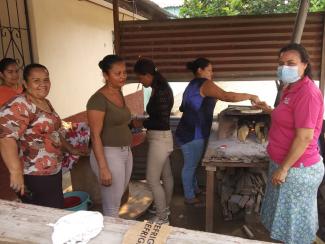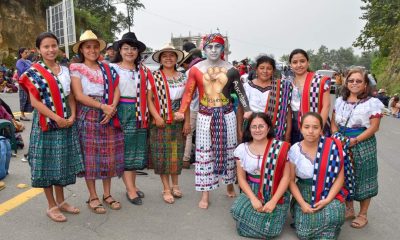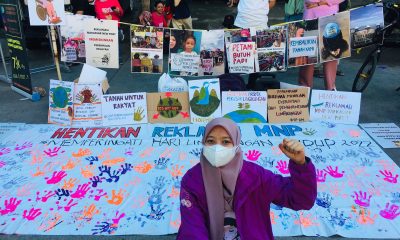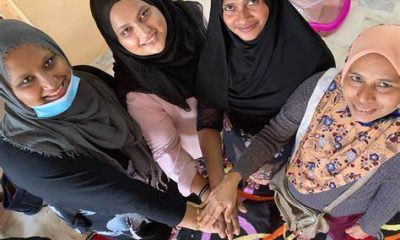By Laura Carlsen Km. 148 is a nodal point on the Interamerican Highway that connects…

Women are stepping into this moment of crisis with great resolve, creativity, and resilience. While the multiple roles women play as caregivers, workers, and organizers make them more vulnerable, it also enables women to be critical first responders. Not only are women responding to immediate needs such as food, sanitation, and health care, but are mobilizing their communities to be better organized and safer. Women are also using this moment to be resourceful and build and nurture community and sustainable ways of living that preserve the environment and our future. Rather than hear from us, hear directly from these women leaders.
Guatemala: Activating healing community practices
Sebastiana Par, an ancestral authority and member of the Council of Quiché Peoples in Guatemala
While we are fearful and having difficulties organizing, this situation is an awakening for us. Today, more than ever, we value our community practices: from the way we feed ourselves, heal ourselves, share and understand life, and how we know our relationship with Mother Nature. As advisory authorities and spiritual guides, or aquijap, we coordinate by telephone with neighbors to fortify what we eat and support our body’s healing, as well as using medicinal plants. We believe that through our ancestral medicine, we can also experience this situation differently. We are connected with our spirituality, our ceremonies, our candles, our incense, and our plants, to request a solution on behalf of all the universe. We hope that you too, wherever you are, will also activate your spirituality so that together we can address this problem.
We also must decide on some strategic actions among organizations, among women, and the aguijap. We must define immediate strategic actions that support us because we know that the government or governments do not respond to us. We must organize ourselves and be more creative in looking for solutions to this crisis. We must be active in our territories and bind together our links of cooperation. We must take advantage of technology and connect on social media. We must demonstrate to ourselves that there is a solution. We cannot remain fearful; we cannot stay frustrated; we cannot make this crisis even bigger.
Honduras: Using community radio to break isolation and share strategies
Daysi Flores, Communications Regional Coordinator, JASS Mesoamerica
At a time where people are at risk of feeling isolated and disconnected, JASS is using her community radio program with indigenous and rural women (Tercas con las Esparanza/Stubborn with Hope) to connect hundreds through podcasting radio segments and sharing them more broadly via WhatsApp. Through this strategy, JASS is enabling diverse women to build connection, community, and solidarity, while sharing information, strategies for organizing and survival with each other. As Daysi Flores, coordinator of the program says, “Community radio allows us to amplify women’s voices and strategies during these difficult times where movement building (care, solidarity, collective power, and more) should be at the center of creating a new world.”
Malawi: Organizing to protect all
Sibongile Singini, Malawi Country Coordinator, JASS Southern Africa
In the wake of the COVID-19 pandemic, nurses, doctors, and other health care workers across Malawi organized a national strike to demand protective wear to do their job without fear and risk of infection. The strike, however, also inadvertently impacted people’s ability to access healthcare. This was precisely the case when Makata Health Center in Blantyre one of the 28 districts of Malawi closed, leaving the (local) women of Our Bodies, Our Lives (OBOL) – an 8000-strong initiative for access to healthcare and equality for all – unable to access their medicines from the ARV (antiretroviral) clinic. With their health at risk, OBOL women from Makata area acted. These efforts ensured that women both got their medication, and in the process, that healthcare workers got protective wear. JASS’ Sibongile Singini had this to say, “I am happy to see how women stepped into their power. First, they used the power within and saw the need to take this issue to the committee member of the traditional authority of OBOL. And after looking at the issue, the committee member said, no, let us use the power with others to make sure we overcome this issue. That power with was also combined with the collective power to make sure that issue was tackled effectively. Working with partners is powerful and having allies in the Ministry of Health helped us. If it were another organization that the Ministry did not know, they maybe would have done nothing. But the Ministry of Health said Just Associates is powerful, let us do something otherwise these women will tell the whole Malawi what we are doing. So, I am happy that they recognize the power of women and what women can do. That this power forced them to act urgently because they knew that if they did nothing, women would not stay silent.”
Indonesia: Mapping impact and women’s contributions
Niken Lestari, FAMM-Indonesia
I think COVID calls for collective action at local, national, and international levels to support women who work in the informal sector and those on the margins of society. People are showing their solidarity by crowd funding and directly helping those in need. However, many of these actions are temporary. The challenge is how to plant seeds for change that can continue to sprout even after the pandemic. How to use our critical thinking to be more organized rather than use it to spread the vested interests or agendas of fundamentalists.
FAMM members are leading initiatives in their communities. For example, producing facial masks and hand sanitizers and delivering food materials to their communities who are indigenous peoples, children, transgender, women-headed households, victims of violence, and health workers. Our members are also involved in mapping the impact of COVID-19 at the provincial level. With our feminist perspective, we are hoping to offer better mapping that integrates the needs of the most vulnerable communities. For example, highlighting the active roles women play in urgent response at local level. Many of these roles are volunteer based with little to no money. We want to make sure that these contributions by women are counted and recorded.
Zimbabwe: Using radio to elevate women’s demands
Lucy Mazingi, JASS Southern Africa Co-Director
We are raising awareness on COVID-19 and how it is disproportionally affecting women. JASS is partnering with Chengeto – a media-based organization that has access to five radio stations in Zimbabwe – to profile demands, What Women Want, particularly, access to water which is a critical need during this moment. Through radio, women are sharing information about hygiene at this time and how the lack of access to water has increased the burden of care for them yet is resulting in creative solutions. This strategy is amplifying women’s advocacy on the ground with local authorities and other agencies who are now providing tanks of water and rehabilitating some non-functional boreholes in communities. In areas like Masvingo, access to municipal water has improved making it possible for people to practice hygiene. We will continue to elevate women’s demands by mobilizing women so that we continue to have water in our taps and boreholes even post COVID-19.




























